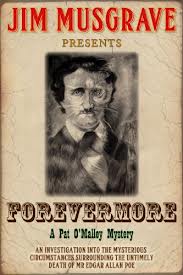Patrick O’Malley, former military man and admirer of Poe’s, has fashioned himself a detective to rival Poe’s character C. Auguste Dupin, intent on clearing away the unsavory gossip surrounding Poe’s untimely demise on the streets of Baltimore in October of 1849. Certain Poe was murdered, O’Malley embarks on a journey that includes interviewing a number of Poe’s contemporaries, friends and foes alike. As he works his way through the list, which includes writer Henry Wadsworth Longfellow and John Anderson, owner of a tobacco shop involved in his own scandal, O’Malley must solve the crime before he becomes a victim of those who’d like to keep the truth hidden.
Theories about Poe’s death rival any mysteries that Poe himself wrote. Unlike Poe’s detective fiction, there will never be a final determination as to what or who killed him, and that’s what makes the circumstances perfect for a detective story. Musgrave has obviously done extensive research, keeping the basic framework—including dates, the enmity between Longfellow and Poe, the connection between murdered Mary Rogers and Poe’s story “The Mystery of Marie Rogêt,” and the role the Plug Uglies gang might have played in Poe’s death—to create a plausible tale. The writing sometimes comes across as dry due to the sheer amount of factual information the author includes. It also reads somewhat stilted in places, though that may be due to both the setting (late 1800s) and the author’s presumed intent on FOREVERMORE reading like a Poe story. More troubling was O’Malley’s sex life, or rather lack of it, and how it was supposed to have played into the story as a whole—that could have been tied in more effectively than it was.
FOREVERMORE is an interesting take on Poe’s death.
Reviewed for IndieReader by K.J. Pierce

